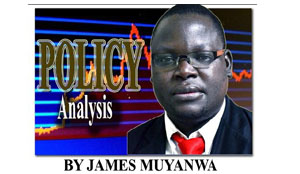 I SPENT the Heroes and Unity holidays in my home town Kabwe and while there, I could not help but wander into history lane, wondering as to what had happened to the declaration of the former mining town as a tax-free zone.
I SPENT the Heroes and Unity holidays in my home town Kabwe and while there, I could not help but wander into history lane, wondering as to what had happened to the declaration of the former mining town as a tax-free zone.
In 2002, Kabwe was, along other towns like Livingstone in Southern Province, Ndola and Luanshya on the Copperbelt, declared a tax-free area by then Republican president Frederick Chiluba.
From my basic research, a tax-free zone (or area) is a place designated by the Government to encourage new business investment with the objectives of creating jobs and local economic development.
That definition leaves out one important element, the tax.
Therefore, the more apposite meaning of tax free zone would be: “A region (or district) within the country in which customs duties and other types of indirect taxes are not applicable.”
The economic players within the tax free-zone are exempted from paying the relevant taxes to the government as a way of attracting and retaining investments.
Therefore, given what Kabwe had become by 2002, following the closure of the mine – in 1994 – and other companies later, the move by the Government then was worthwhile.
Two years down the lane, however, late president Levy Mwanawasa said in July 2004 that the declaration of the involved towns as tax-free zones by the former administration had not yet been implemented
Mr Mwanawasa had said the tax-free zones had not been effected because of certain technicalities which were still being addressed by his Cabinet
Four years later report by Chrispin Rodaka Matenga, a researcher, indicated that “the modalities of the setting up of a tax free zone are still being worked and benefits yet to be realised.”
The report titled: “Rapid Assessment of Child Labour in Non- Traditional Mining Sector in Zambia,” also reveals that only six manufacturing industries had remained operational by that time.
Obviously, this is a sad story, especially for Kabwe, which out of the districts which were declared tax-free zones, was seemingly the hardest hit by the effects of the liberalised economy and still seems incapable to recover from the blow.
As Kabwe Central Member of Parliament James Kapyanga said in his maiden speech to Parliament in 2011, apart from the closure of the mine, the deplorable economic state of Kabwe can be attributed to closure of other firms.
These firms include Mulungushi Textiles, Small Industrial Development Organisation (SIDO), General Pharmaceuticals Limited and Kabwe Milling coupled with the underperformance of the Zambia Railways Limited (ZRL) then.
This state of affairs even earned the town the term of “Ghost Town” at one time.
While the re-opening of the mine in Luanshya seems to have returned some semblance of economic occupation to that town, with the boom of the hospitality industry driving the Livingstone economic recovery, Kabwe has not been that blessed
It has not even gotten the full benefits from the revival of ZRL, which was previously headquartered in the central provincial capital, because, unlike mining, railway operations are dotted along the line of railway not just in one town.
Therefore, if there is no need to implement the tax-free zone system in other towns, which I believe is still law, it is inevitable that the Government does so for Kabwe, to salvage the area from further economic miseries.
According to Mr Matenga’s report, following the demise of the lead and zinc mining activities, the manufacturing and transport sectors are now the largest employers in the formal sector, followed by the energy, agriculture and the commercial sectors.
In addition to the closure of the mines, the closure or privatisation of other key industries has pushed quite a large segment of individuals from formal employment into the informal sector
This has definitely led to the erosion of incomes, as was evident during my short stay, affecting the viability of many businesses including agriculture.
The population’s buying power, especially the urban population declined seriously prompting disinvestment from the district.
The resultant informal sector, heavily reliant on trade and harvest of natural resources like fish, Charcoal and timber, albeit at small scale, has spread alongside street vending.
In the second part of this article, therefore, I intend to look at what exactly has happened to the declaration of Kabwe and other towns as tax free zones, to ascertain whether it has been abandoned all together or has just been put on hold.
I would move a step further and inquire as to what the position is for the Government on the tax free zones and what plans it has to reclaim Kabwe from the current economic limbo.
Comments: 260 0955 431442, 0977 246099,0964 742506 or email:jmuyanwa@gmail.com






